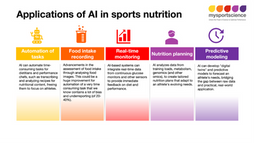What is the best protein source for building muscle?
- Oliver Witard
- Nov 3, 2017
- 4 min read
Updated: Apr 14, 2021

The best choice of protein source for building muscle is, without question, a hot topic in Sport Nutrition. Sport scientists, dieticians and nutritionists alike are often posed the following two questions:
Do proteins from dairy, meat, and plant sources differ in their capacity to promote muscle growth during resistance exercise training?
And if so, which is best?
Before we answer these questions let's discuss the best approach to tackling these questions.
A look inside the laboratory
The best science behind the most effective protein source for building muscle is based on data generated from carefully controlled and somewhat sophisticated laboratory studies. These studies usually involve strength-trained volunteers ingesting a single source of protein soon after a one-off weight-lifting workout. Simultaneously, skilled researchers apply what is called “stable isotopic tracer methodology”. This technique involves slowly pumping labelled (or “heavy”) isotopes consisting of synthetic amino acids directly into one forearm vein, serial blood sampling from the other and the collection of muscle biopsies, usually from the easily accessible vastus lateralis muscle. With access to specialized analytical instruments, not to mention technical expertise, this laboratory approach allows for the determination of muscle protein synthesis (MPS) — the “gold standard” for measuring the muscle building response to a given protein source.
What does the science tell us?
Animal sources of protein are often touted as more effective for muscle building than plant proteins. Consistent with this idea, laboratory studies have reported a greater post workout response of MPS when strength-trained young men consumed either skimmed milk or whey protein vs. a matched dose of soy protein [1, 2]. As further proof that animal proteins trump plant proteins, a study in middle-aged men revealed a greater stimulation of MPS at rest after ingesting a 100g (4 oz) lean beef steak vs. a soy protein marketed and sold as a bona-fide replacement for beef. Plus, in healthy older adults, ingesting 35 grams of micellar casein protein stimulated a greater MPS response compared with a matched dose of the cereal protein, wheat. So, what makes the dairy proteins and beef more potent than soy and wheat in terms of stimulating MPS? And is it all bad news for the vegetarian/vegan strength-based athlete?

As detailed in a previous blog, different protein sources are characterized by unique digestive properties and amino acid profiles. Most animal-based protein sources, including dairy, meat and eggs are more digestible than plant proteins such as soy, wheat, rice and potato. This means that a greater percentage of amino acids derived from animal protein sources successfully negotiate the small intestine and reach the circulation, rather than being extracted by the gut or taken up by the liver. As such, more amino acids (or building blocks) become available to the muscle for making new muscle protein, i.e. MPS, after ingesting most animal vs. plant protein sources.
As illustrated in the infographic above, plant and animal proteins also differ in terms of amino acid profile [3]. The essential amino acids (EAA), i.e. those amino acids that must be supplied by the diet, — in particular the amino acid, leucine — are key to driving MPS. In addition to providing a building block for making new muscle proteins, leucine itself acts as a signal to switch on the process of MPS. Crucially, as a general rule, the leucine content of animal proteins (8-13%) exceeds plant proteins (6-8%). The same applies for EAA content. In fact, whey, milk and casein are the only protein sources with a higher constituent EAA content compared with human muscle itself. Plus, animal proteins typically boast a complete profile of all 9 EAA’s, whereas plant proteins are deficient in at least 1 of the EAA’s, usually lysine or methionine. So, it seems clear that the superior response of MPS to ingesting dairy and beef proteins compared with soy and wheat proteins stems from inherent differences in digestive properties and amino acid profiles between proteins.
What next?
However, there are exceptions to these rules that, as such, offer hope for alternative plant-based proteins and therefore vegetarian strength-based athletes. For instance, the plant protein maize boasts a leucine content of 12% that exceeds most animal proteins. Plus, quinoa consists of an unusually high lysine (7%) and methionine (3%) content and therefore contains a full complement of all EAA. So, it may be that other plant proteins, in addition to soy and wheat, such as maize and quinoa are equally effective as so-called “higher quality” animal proteins from dairy or meat sources. Moving forward, as is so often the case in Sport Nutrition, much more work is needed before we as sport scientists can definitely state what protein source is best for muscle building in strength athletes.
Key points
Digestibility and amino acid composition are key factors that determine the potential of a protein source to stimulate MPS.
As a general rule, the leucine content of animal proteins (8-13%) exceeds plant proteins (6-8%)
Based on currently available evidence, animal proteins such as dairy and beef confer an advantage over plant proteins such as soy and wheat with regards to stimulating MPS post workout.
The potency of alternative plant proteins such as maize, lentil, quinoa and pea for stimulating MPS post workout remains unknown.
References
1. Wilkinson SB, Tarnopolsky MA, Macdonald MJ, Macdonald JR, Armstrong D, Phillips SM. Consumption of fluid skim milk promotes greater muscle protein accretion after resistance exercise than does consumption of an isonitrogenous and isoenergetic soy-protein beverage. Am J Clin Nutr. 85:4:1031-40, 2007.
2. Tang JE1, Moore DR, Kujbida GW, Tarnopolsky MA, Phillips SM. Ingestion of whey hydrolysate, casein, or soy protein isolate: effects on mixed muscle protein synthesis at rest and following resistance exercise in young men. J Appl Physiol 107:3:987-92, 2009.
3. van Vliet S, Burd NA, van Loon LJ. The skeletal muscle anabolic response to plant- versus animal-based protein consumption. J Nutr. 145:9:1981-91, 2015












